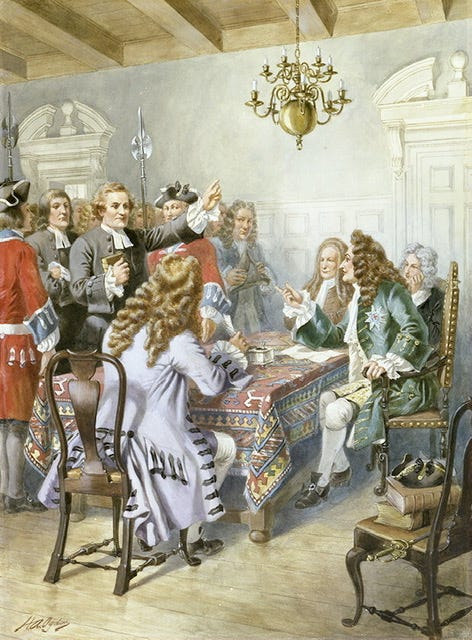The north winds of the sea cascaded down the hills into the small Irish town. But Francis Makemie was no Irishman. His parents were Scots. They worshiped at the small Scottish kirk; Francis studied the Bible, Homer, and Virgil at schoolhouse that had the earth as its floor. Francis was converted under his schoolmaster, who was also a minister, and described it as, “a work of grace and conversion wrought in my heart at fifteen years of age, by and from the pains of a godly schoolmaster, who used no small diligence in gaining tender souls to God’s service and fear.”
When Francis was older, he went to the country of his heritage to study at the University of Glasgow, and finished third overall in his class. Following his graduation, the religious wars led to the arrest and imprisonment of many Presbyterian ministers of the Laggan presbytery.
They called upon Makemie for pulpit supply many times and, in due time, licensed him to preach the gospel of the Lord Jesus Christ. When the moderator of the presbytery was released from prison, he began the effort of establishing Presbyterian churches in the American colonies. Francis Makemie went with him, and thus became the founder of American Presbyterianism.
Makemie landed in Maryland, making him the founder of Southern Presbyterianism, as well. His evangelistic zeal was not left on the other side of the Atlantic. He began planting churches across the state, and soon he was contained to Maryland no longer, as he crossed into Virginia to further the same efforts. There he was married and labored fervently, more so than when he was in Maryland. After several years of the work, Makemie sailed back to Ireland and Scotland to give a report of the great work God was doing in the American colonies.
The Presbyterian churches, out of their joy, sent two ministers back with Makemie and enough money to cover their expenses for two whole years. The work was growing stronger, but would soon be met with resistance.
Following a few years of hard work, Makemie and one of the ministers sailed to New York in attempt to preach throughout New England. However, the royal governor of the colony, Lord Cornsbury, would not allow it. They were not allowed to preach in his colony with their licenses. Makemie showed Cornsbury the licenses, and how they complied with English law, but the governor still refused. His domain; his rules.
“You must give bond and security for your good behavior, and also bond and security to preach no more in my government,” threatened Cornbury.
“Endeavoring always so to live as to ‘keep a conscience void of offence towards God and man,’ yet if your lordship requires it, we would give security for our behavior; but to give bond and security to preach no more in your excellency’s government, if invited and desired by any people, we neither can nor dare do.” These were Makemie’s bold words in reply.
“Then you must go to jail,” said the governor.
“We are neither ashamed nor afraid of what we have done, and we have complied and are ready still to comply with the Act of Parliament which we hope will protect us at last.”1
And so Makemie and the other minister spent six weeks in jail before the charges were dropped and they were set free. They returned to Virginia, but it was not over for Makemie. The battle had to be won.
Five months later, Makemie sailed back to New York to face trial for charges that were already dropped. He stood courageous and rebutted every assailing argument, and won the trial. After the victory, he went to the intended church to do what he originally came to do: preach.
Lord Cornsbury was later removed as the royal governor of the colony of New York, and Makemie died the next year.
Because of Makemie’s efforts, eight years following his death, there were 17 ministers across 4 presbyteries, which founded the first American Presbyterian Synod at Philadelphia.
Pages 17-18. Southern Presbyterian Leaders: 1683-1911 by Henry Alexander White. Banner of Truth





